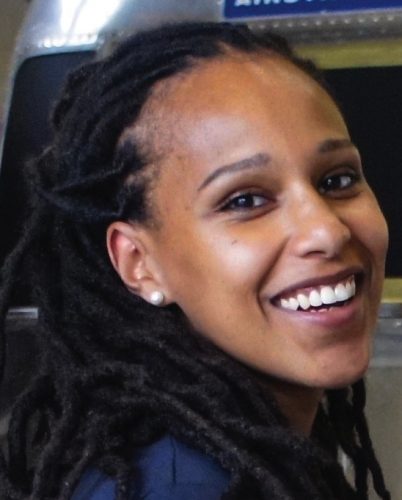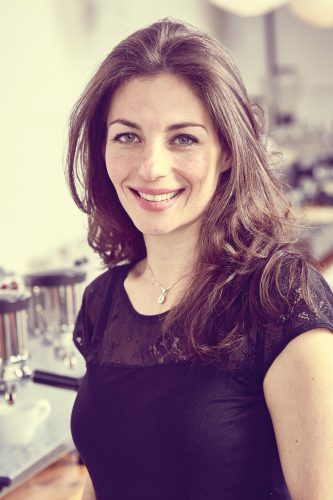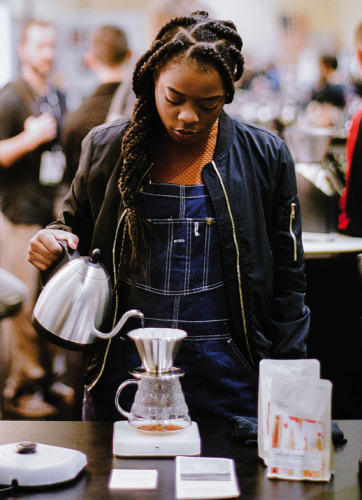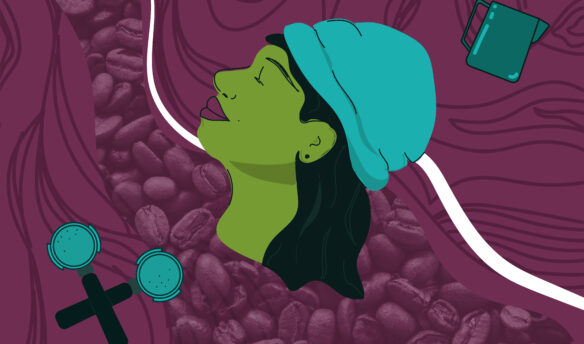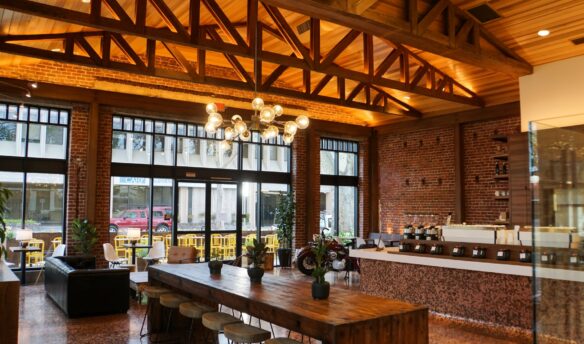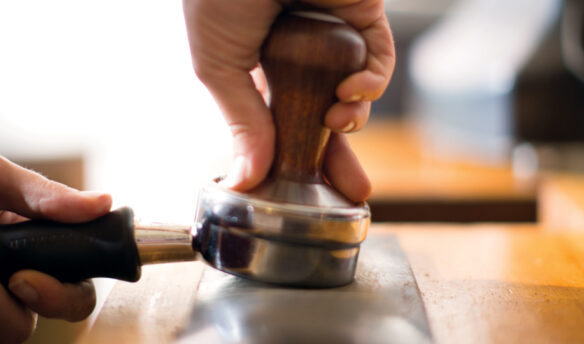The specialty coffee industry is not very inclusive, says Colleen Anunu, whose career includes stints as a barista, roaster, and coffee buyer for New York’s Gimme! Coffee. She now works to support producer empowerment and advance sustainable trade with Fair Trade USA, and also serves on the board of directors for the Specialty Coffee Association.
“It’s very much driven by a certain type of individual who has the capacity, resources, and opportunity to open a business in the first place,” Anunu says. “Those who had the time and money, access to credit, and other necessary resources to be an entrepreneur—and so primarily it’s a white male-driven industry.”
When it came to her own advancement in the industry, privilege played a role, she says. “I was educated, had secondary education, and time. There were resources available to me that I could benefit from.”
Despite the opportunities available to her and strides she had made over a decade-long career, Anunu felt constrained by a “glass ceiling” in the coffee industry—a barrier to professional advancement that especially affected women and members of minority groups.
Discouraged but not beaten, she decided to set off on another path to develop her career. She enrolled at Cornell University and completed a master’s degree in international development.
“This isn’t the standard career trajectory,” she says. “I think that’s the experience of so many people—especially women, people of color, and non-normative folks. They have to forge their own path because the opportunities that are out there don’t really accommodate different perceptions of what values someone can bring to a company.”
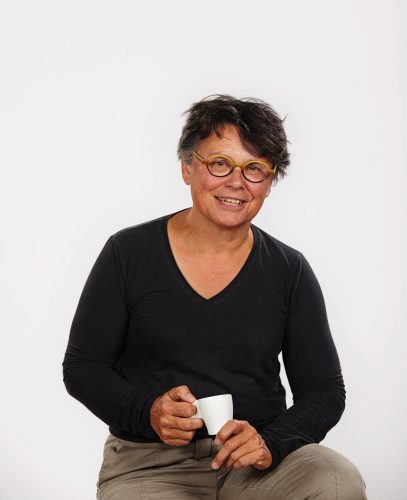
Paula Koelemij is manager of category management and sourcing for Simon Lévelt coffee and tea stores in The Netherlands. She acknowledges a lack of diversity within the industry, but says human nature is partly to blame.
“There is group culture in Europe, so it makes it very hard to have diversity,” she says. “We stick together in our groups where we share the same ideas, values, and preferences.”
Before starting in coffee in the early 1990s, Koelemij was involved in the women’s rights movement. “When I entered the coffee sector I was shocked. I was looking around at some of the meetings, and I was the only woman. Everyone was male in suits, grey and dull.”
Twenty-five years later, the industry has an ever-increasing number of women baristas, buyers, roasters, and competitors—but the ratio of men to women is still far from equal.
“I am convinced it’s a matter of ideology, instead of women’s and men’s problems,” Koelemij says. “I have known so many men who identify the problem and want to do something about it. And although you expect women to be more engaged and committed to making a change, that’s not always the case,” she says.
“You can talk to women colleagues, and they say, ‘I have no problem, so there is nothing wrong,’ typically in a defensive manner. This is because they wish to ignore it and not see themselves as a victim.”
Barista Rahwa Gebremeskel does not see herself as a victim.
“I don’t want to have this victim role. You are in control of creating your energy, surroundings, and circumstance,” she says.
This inner resolve helped her when she had to make the tough decision between working at Barsupport, a Rotterdam-headquartered beverage caterer in The Netherlands, and becoming a full-time mother.
“Motherhood is a beautiful thing. But its downside is it makes you choose between career and your children. When I had my first child, I decided to continue working full time, and my mum would babysit. I did this for six weeks after giving birth. But I was not getting into the motherhood flow of things and my mum was raising my child. It did not feel right.”
After having a second baby, Gebremeskel decided to quit her job and become a full-time mother. “It was hard. I love my work and the connection with my guests and other baristas. But I felt I had to do this for my kids.”
Rose van Asten is a mother and a full-time coffee industry consultant based in The Netherlands. “Motherhood shouldn’t be the reason to stop you from working or pursuing your goals—never feel ashamed for making that decision,” she says.
Women have become accustomed to making the difficult choice between having children or a career, though more and more men are also having to confront this dual reality.
“We have these ideas from the past about how mothers are responsible for the children, and fathers are responsible for bringing in the money,” she says. “That’s the easy way to think.”
In van Asten’s family, her husband has taken on more responsibility for the care of their children. “Mothers are often made to feel ashamed for going back to work, and fathers are ashamed if they are the ones taking care of the house,” she says. “I know my husband had many issues. He had moments where he was like, ‘What do I say to people?’ He’s fine now and not embarrassed about it, but it took a whole lot of soul-searching. He was feeling bad for not contributing financially, even though he was contributing hugely to the household.”
Encouraging equity is one of several endeavors undertaken by Barista Hustle. Part coffee subscription service, part barista education resource, and part online community, Barista Hustle has hired “Chocolate Barista” blogger Michelle Johnson to communicate about gender, race, and inclusivity in the coffee industry and the café space.
Johnson oversees the website’s marketing and communications, including social media. “Barista Hustle’s dedication to making our educational resources and products as accessible to as many people as possible aligned perfectly with my personal values,” she says. “I knew I could bring on my experience as a coffee social activist to take that to the next level.”
Johnson says it’s great to see this movement gain traction in the industry, but she’s not celebrating just yet.
“I really need to see more focus around folks in coffee who are in the margins of both race and gender. A lot of conversations separate the two—women and people of color—but that can erase the experiences of us who are at the intersection of both. I am no more or less black than I am a woman, and both of those identities affect my experience in coffee, without a doubt. The same goes for someone who is a trans person of color, whose experience is even more complex than mine.”
In Johnson’s experience, the trend is consistent throughout the value chain: women of color are paid less and hold fewer positions of power in coffee. “We need to do more to center their voices so that we can take action to combat these setbacks and increase equity in the industry,” she says.
Johnson has advice for companies who want to ensure their workplace is open, diverse, and inclusive. “Hiring black and brown people, especially women, transgender, and non-binary folks is a pretty good start. And once you do, do the work to understand our experiences, center our voices, and listen to us.”
Engaging in conversation with one another encourages greater awareness. Awareness triggers action—and that’s how change happens. As professionals and consumers, all of us can inspire and advocate for a more equitable industry.
“Outsiders are always innovating because they want change,” Paula Koelimij says. “So use your position, because if you don’t, nothing will change.”




